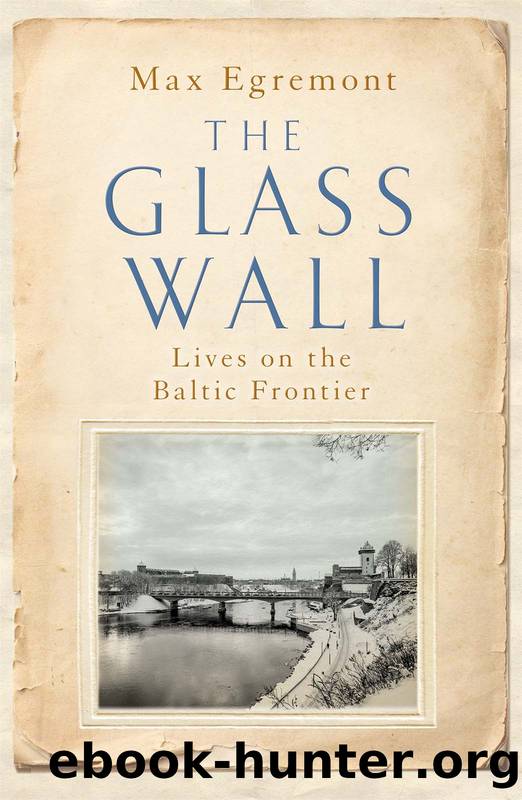The Glass Wall: Lives on the Baltic Frontier by Max Egremont

Author:Max Egremont [Egremont, Max]
Language: eng
Format: epub
Tags: history, Europe, Baltic States, Travel, Eastern, political science, Genocide & War Crimes, geopolitics, Political Ideologies, Communism; Post-Communism & Socialism, World, Russian & Former Soviet Union, Political Freedom, Social Science, Emigration & Immigration, General, Religion, Religious Intolerance; Persecution & Conflict
ISBN: 9781509845460
Google: H_IWEAAAQBAJ
Publisher: Pan Macmillan
Published: 2021-07-22T23:47:54.223812+00:00
Rüdiger von der Goltz.
Would they go to Riga? The attack began, Blanckenhagen riding with his squadron, seeing retreating Bolsheviks and hearing the cry, âThe way to Riga is open!â Childhood friends were ahead, again with those Baltic names â Kruedener, Foelkersahm, Berg, Samson â some soon hit, falling from their horses, their commander and âsoulâ Hans von Manteuffel killed: then over the bridge across the Duna River, with the Landeswehr and the Iron Division and into the city.
Baltic German memoirs state that it was the Bolshevik Latvian âFlintenweiberâ (rifle women) â âmost beautiful thingsâ, devilish participants in âsexual orgiesâ â who committed the worst atrocities in Riga. The Landeswehr, however, embarked on similar violence, the French Colonel du Parquet writing of Bolsheviks forced to dig their own graves and Baltic Germans rampaging through the streets. Four hundred Flintenweiber lay dead, Germans âcallouslyâ marching over them.
Only Germany, Blanckenhagen thought, could stop Bolshevism; it was the nearest great power, now humbled and uncertain but capable of revival. As for these new states â Latvia, Estonia and Lithuania â they were unsustainably small, bound to be absorbed by one of their giant neighbours: Russia or Germany. Only Germany could drag them into the West, away from barbarism.
Whispers of doom, however, could accompany this saving of civilization. In the early winter months of 1919, Herbert von Hoerner, also in the Baltic Landeswehr, broke away to reach his familyâs property in Courland, a manor built in 1849 by his grandfather. The night was achingly cold and he crept through the back door, to find two old Latvian women plucking chickens in the kitchen. Hoerner asked them to make supper; then he went through the freezing rooms to what had been his fatherâs study.
Portraits of ancestors in tarnished golden frames were dim on the walls and a fire crackled in the grate, prompting pride in what his family had done in this now devastated land. Having eaten, Hoerner asked the women to open the front door so that he should leave through it. âI was the last one, who, in departing, was taking something with me that would never return â Old Courland!â Hoernerâs regret was more realistic than Blanckenhagenâs euphoria. Latvia had been almost completely overrun by Bolshevik troops, including the formidable Latvian Riflemen, but the Estonian provisional government raised an army, commanded by men such as Johan Laidoner whoâd served in the imperial Russian forces.
For the Germans, the slide began after their Riga triumph: the defeat outside CÄsis in June 1919 of von der Goltz by the Estonians (and Latvians whoâd joined them), the failure of General Yudenichâs White Russian forces and the Estonian Balts to reach St Petersburg. The British watched; the Foreign Secretary Arthur Balfour was cautious about intervention, Winston Churchill much more enthusiastic. After the German defeat at CÄsis, the Allies pressed for a ceasefire. On 28 June, the Treaty of Versailles was signed, emphasizing the existence of the three new Baltic States, Estonia, Latvia and Lithuania.
Von der Goltz rejected attempts to get him and his forces to return to Germany.
Download
This site does not store any files on its server. We only index and link to content provided by other sites. Please contact the content providers to delete copyright contents if any and email us, we'll remove relevant links or contents immediately.
| Africa | Americas |
| Arctic & Antarctica | Asia |
| Australia & Oceania | Europe |
| Middle East | Russia |
| United States | World |
| Ancient Civilizations | Military |
| Historical Study & Educational Resources |
Machine Learning at Scale with H2O by Gregory Keys | David Whiting(4313)
Never by Ken Follett(3956)
Fairy Tale by Stephen King(3396)
Oathbringer (The Stormlight Archive, Book 3) by Brandon Sanderson(3214)
The Man Who Died Twice by Richard Osman(3078)
Will by Will Smith(2919)
Rationality by Steven Pinker(2363)
Can't Hurt Me: Master Your Mind and Defy the Odds - Clean Edition by David Goggins(2341)
The Dark Hours by Michael Connelly(2307)
Friends, Lovers, and the Big Terrible Thing by Matthew Perry(2230)
The Dawn of Everything: A New History of Humanity by David Graeber & David Wengrow(2208)
Principles for Dealing With the Changing World Order: Why Nations Succeed and Fail by Ray Dalio(2054)
A Short History of War by Jeremy Black(1848)
HBR's 10 Must Reads 2022 by Harvard Business Review(1844)
Go Tell the Bees That I Am Gone by Diana Gabaldon(1758)
A Game of Thrones (The Illustrated Edition) by George R. R. Martin(1744)
Kingdom of Ash by Maas Sarah J(1677)
515945210 by Unknown(1666)
443319537 by Unknown(1559)
